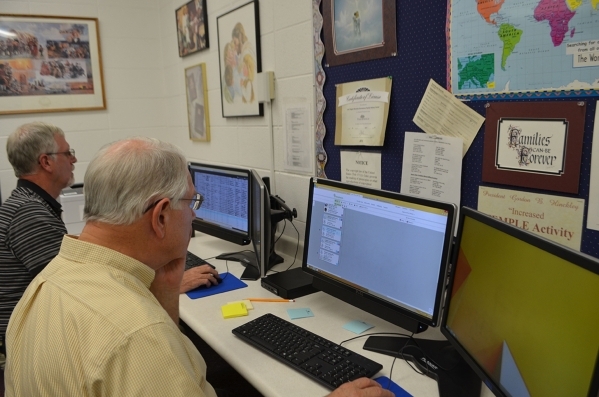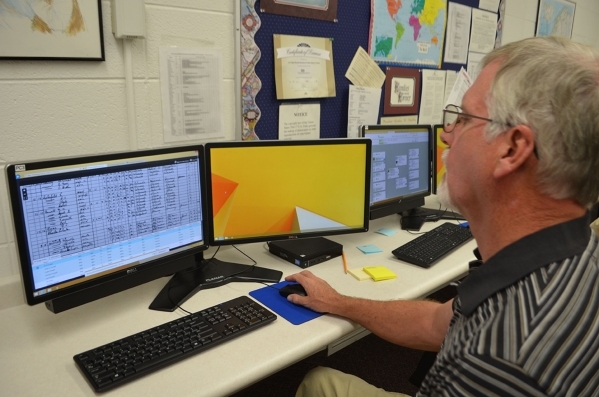Jamboree offers free family history classes at LDS church
Keith Aurich reluctantly agreed to attend his first Family History Jamboree 13 years ago.
"My wife drug me along," he said. "And I've been to every one since. Once the bug bites you, you can't get enough of it."
The next Las Vegas Stake Family History Jamboree is scheduled from 8 a.m. to 3 p.m. Nov. 14 at The Church of Jesus Christ of Latter-day Saints, 221 S. Lorenzi St. Now in its 13th year, the festival is set to offer a roster of more than 40 classes designed to help anyone research their family history.
Following a keynote address by Todd Larkin, the Southern Nevada-area family history director for The Church of Jesus Christ of Latter-day Saints, participants can choose up to five classes. Offerings are set to include classes on combing through census records, county courthouse records and emigration information. There are also classes in using Find-A-Grave, assembling family trees and deciphering old handwriting and documents. Plus, the Jamboree is set to include special classes for youths and classes in Spanish.
The Jamboree is open to the public, and Aurich said at least a third of its participants each year are not members of the Mormon church.
"We have a lot of people come who are not LDS," he said. "It's a big event. A lot of people love family history."
"People are just interested and fascinated about who their relatives and progenitors were," said Kent Simister, Lorenzi Chapel Family History Library volunteer.
Aurich, who is also a family history volunteer, said a book by Alex Haley that was discovered by Hollywood brought a lot of people around when he was younger.
"Remember 'Roots,' the movie?" he asked. "That turned a lot of people's hearts toward family. I remember when I was on my mission, it was a big conversation with people. A lot of people have that. The people I work with just love family history, and it has nothing to do with church affiliation. They just love the knowledge about their family, where they came from, just that kind of desire."
Aurich added that with modern technology and Internet resources, it's easier than ever to research family history.
"There's so many ways to get documents or data or more information, where before it was such a hard process," he said, pointing out that before the Internet, combing through microfilmed records was considered the easy way. "It was difficult. We still have microfilm readers right in the other room, but with family indexing, they're recording all the information so that anybody can get at that information without a microfilm reader once all that stuff has been transferred over to digital. There's a lot more data that's available to anyone because of the Internet."
Recent medical developments have given researchers even more avenues to solve family history mysteries.
"Now they have this DNA stuff, which is interesting," Aurich said. "You can find out what nationality you are."
Family History Jamboree volunteer Judy Tobler said DNA testing helped solve a question in her family.
"The family legend in my family was that one of our grandfathers married an Indian woman," she said. "But nobody really knew for sure. So one of my cousins had her DNA done, and there is no Indian blood."
Simister said it's important to realize that family history is more than just genealogy, which focuses on birthdates, death dates and lines of succession. Today's researchers are searching for stories, not just names and dates. Searching for journals and other documents helps fill in the blanks.
"When you look at just names on a genealogical sheet, they're kind of like stick people," Simister said. "When you do family history, you become connected heart-to-heart with those people. That's where Elijah said, 'I'll turn the hearts of the people.' You develop a love for them, a relationship and appreciation for them."
Aurich said family history can be recorded, shared and used to bring history to life. In his own family, his wife's family journals helped make a tour of Nauvoo, Ill., an early church history site, personal.
"My wife had several journals written by her ancestors who lived in that area," Aurich said. "We went to those areas and actually read the journals at Far West, in Nauvoo, at all these different stops. I'll tell you, that brings a whole new meaning to those locations. It's not just driving through and visiting them when you actually read what they were doing at that time. It's just shakes you, just really gets to you."
In addition to getting help at the Jamboree, anyone is welcome to access specialized family history software and hardware from 9 a.m. to noon and 7 to 9 p.m. Tuesdays, Wednesdays and Thursdays inside the Lorenzi church's Family History Library. At least two volunteers are on site during every shift to help coach newcomers and the seasoned alike as they use a bank of newly updated computers. In addition to the Lorenzi library, there is the Las Vegas FamilySearch Library in the church at 509 S. Ninth St.
Use of the libraries and attendance at the Jamboree are free. Simister pointed out that even lunch is free at the Jamboree. It is set to incude sandwiches and cookies baked by Peggy Whetten, a volunteer who makes more than 500 every year.
"And they're world-famous cookies," said Simister's wife and fellow volunteer, Patsy.
For more information and a complete schedule, visit lvstakefamilyhistoryjamboree.org.
— Contact View contributing reporter Ginger Meurer at gmeurer@viewnews.com. Find her on Twitter: @gingermmm.
Family History Jamboree
Nov. 14, 8 a.m. to 3 p.m.
The Church of Jesus Christ of Latter-day Saints, 221 S. Lorenzi St.
Classes to help anyone research their family history. Classes for youths and in Spanish, too.
Specialized family history software and hardware available 9 a.m. to noon and 7-9 p.m. Tuesdays, Wednesdays and Thursdays, church’s Family History Library
Las Vegas FamilySearch Library
509 S. Ninth St.
Info: 702-474-0904
a href="http://www.lvstakefamilyhistoryjamboree.org" target="_blank">lvstakefamilyhistoryjamboree.org




















